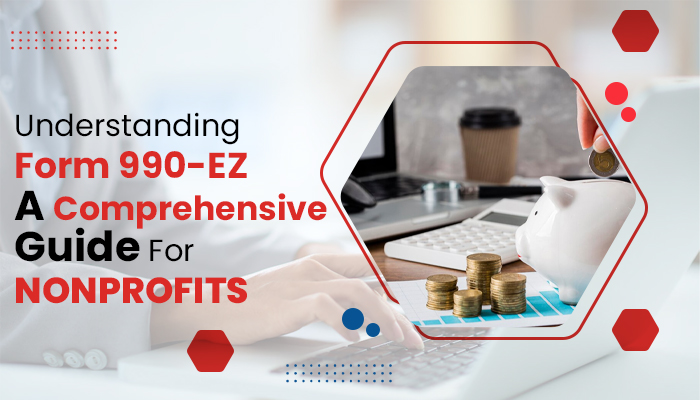- November 28, 2023

The IRS Form 990 is for philanthropic organizations to file their annual information returns. This Form pertains to federal tax-exempt organizations, and it serves to offer the IRS an overview of the activities of the organization, its governance, and its detailed financial information. Most tax-exempt nonprofit organizations should file some variants of Form 990, such as Form 990-EZ, 990-N, etc, on the basis of the total assets and gross receipts of the organization.
Table of Contents
Everything you need to know about Form 990-EZ
The IRS Form 990-EZ is an annual tax information filing form that is used by organizations falling under the 501 (C) series of tax codes. This Form exempts these organizations from paying their taxes. This annual tax Form for nonprofit organizations ensures that the organization does not take advantage of their privileges and re-invest the money they earn for philanthropic activities. In short, organizations falling under the category of 501(c) (1), 501(c) (2), and up to 501(c) (29) have to file Form 990 EZ to maintain their tax-exempt status.
Organizations that fail to file Form 990-EZ will lose their tax-exempt status. This EZ category of the 990 Form pertains to small and medium-sized nonprofit organizations. This Form is filed by organizations with gross receipts between $50,000 and $200,000. It is actually a simpler version of the standard 990 Form, with only four pages. In order to file this with the IRS, the organization requires certain supplemental information such as grant funding details, program accomplishments, balance sheets, etc.
The due date for filing the 990 EZ Form
The due date for filing Form 990-EZ is the 15th of May every fiscal year. For organizations that follow a different fiscal year, the due date is the 15th day of the 5th month after the fiscal year ends. Organizations that fail to file Form 990-EZ within the deadline will be imposed a penalty of $20 per day if the return is late, with a maximum penalty of $10,000, or they will be imposed with 5% of their gross receipts, whichever is less. Those failing to file the tax Form for three consecutive years will lose their exempt status and will have to reapply again.
As the penalty for failing to file Form 990-EZ is expensive, organizations can always ask for a tax extension by filing Form 8868 before the deadline. This will entitle the organization to an additional six months to file the returns. Nonprofit organizations can easily E-file to avoid last-minute hassles and tensions. They can file them online within a few clicks with the help of a credible tax filing company.
E-Filing Form 990-EZ
IRS encourages all its taxpayers to file tax forms electronically. Even for not for profit organizations, it has become a standard practice to file their returns electronically. By choosing to E-file 990-EZ, the taxpayers are required to answer only a few simple questions, and the software will automatically fill in the items on the Form, making the entire process simpler and easier for the organization. They will,
- Guide the taxpayer across the different steps in e-filing 990 Forms with correct pieces of information.
- They will securely store important information with respect to the organization and allow them to access financial data easily from the past years. This helps in faster submission of Form 990-EZ.
- By choosing to e-file Form 990-EZ, organizations can mitigate human error and ensure accurate, complete, and timely submission of the tax Form with the IRS.
Filing Form 990-EZ within the deadline is mandatory, as it helps the organization maintain its tax-exempt status. Non-filing the Form within the deadline attracts hefty penalties as well. Thus, it is better to E-file the 990-EZ Form to avoid last-minute hassles and human errors and to preserve the tax-exempt status of nonprofits.
